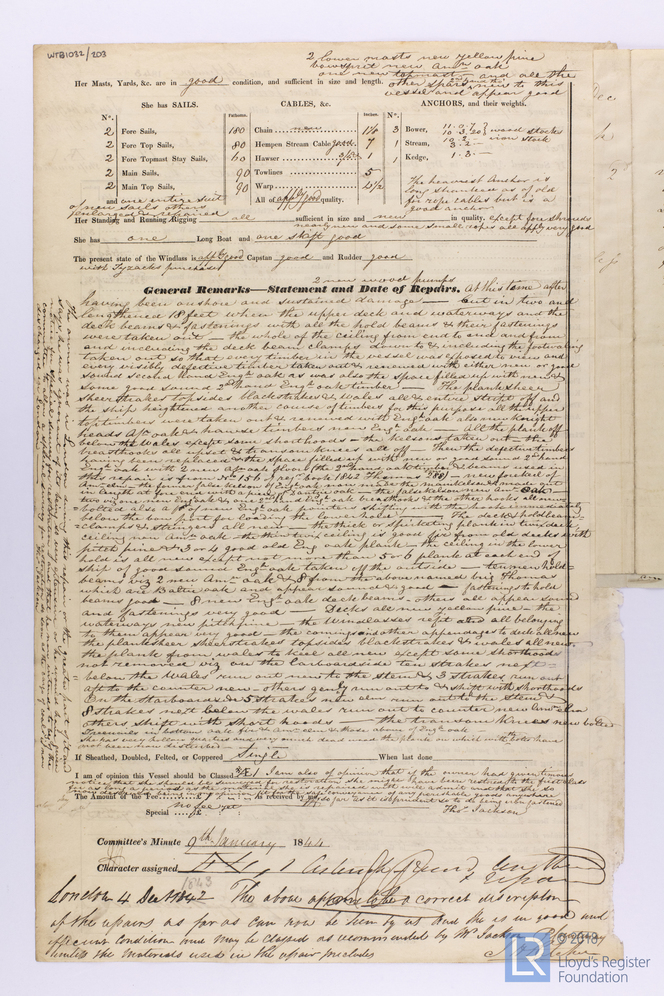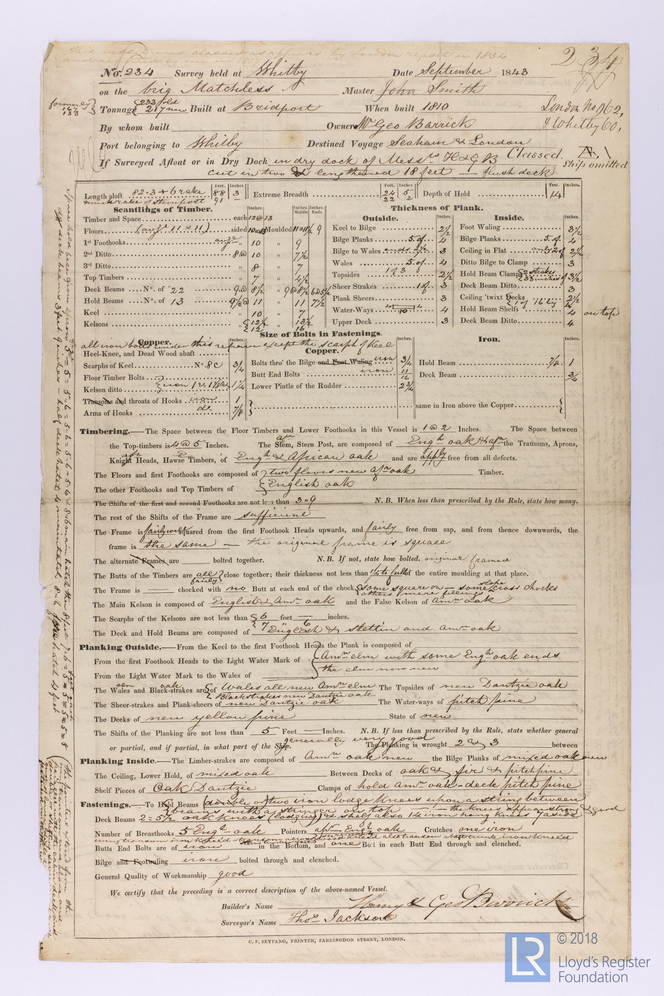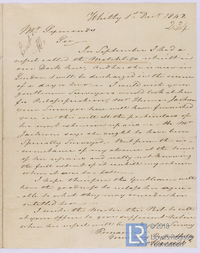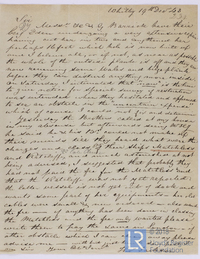- Related documents Related
- Full details Details
- Report document? Report?
Use the data export button to extract customised data sets from the Ship Plan and Survey Report Collection. Available in TSV and CSV formats.
Date recorded as the time of writing.
__/09/1843
The year in which a vessel’s construction is completed.
1810
The country in which the vessel’s construction took place, at the time of writing.
United Kingdom
Unique internal numbers used for identifying, referring and retrieving a specific survey report.
234
Other/additional record(s) specifically mentioned, referenced or associated to another record.
Whitby 60; London 962
The listed port to which a given vessel belongs.
Whitby
The individual and/or organisation listed
George Barrick
Name of the individual/entity/organisation responsible for authoring the record
Thomas Jackson
Location where a vessel’s survey was undertaken.
Whitby
Date of the meeting of the Classing Committee.
09/01/1844
The name of the port/place of destination given.
Seaham; London
A vessel’s means of propulsion.
Sail
Predominant material(s) utilised in a vessel’s construction.
Wood
System of admeasurement referred to as ‘Builder’s Old Measurement’ (BM or BOM) in place between 1786 and 1836.
233
Types of timber used throughout a vessel’s construction
EO - English Oak; AO - African Oak; AmO - American Oak
Type of timbering specifically utilised for the vessel’s interior.
O - Oak; AmO - American Oak; F - Fir; PP - Pitch Pine; DO - Dantzic Oak/Danzic Oak; EO - English Oak
Is machinery fitted at the aft of the vessel?
No
Generally a smaller additional auxiliary boiler (often used while the vessel is at port).
No
Name of the Proving House responsible for the public testing and certification of a vessel’s anchors and/or chain cables.
No
Measurement from the extreme outboard point of starboard to the extreme outboard point of port.
24'5"; 22'2"
Pertinent, useful or interesting recorded content.
Two measurements for extreme breadth have been given; states that the vessel was originally classed in a London survey report no 962, and was also reported at Whitby in 1837; this time she has been viewed in the dock of H & G Barrick where she was cut in two and lenghtened by eighteen feet; because of this, both her new, and former tonnages prior to the lengthening are noted; lists the specifics of the repairs the vessel underwent in great detail; surveyor states that had her owner allowed enough time to have the vessel surveyed for restoration, she might have obtained the highest class her materials would allow, but he has waited too long and she is only to be classed AE1; vessel also put in at Whitby damaged after running ashore; owner is in London at the time of these repairs, not realising that scale of the repair, and so asks the committee to allow him to obtain a special survey for restoration as soon as the vessel's cargo of coal can be discharged in London. Former tonnages used to be 167 and 133
Name of ship as recorded on the record
Matchless
The port or place in which the vessel’s construction took place, at the time of writing.
Bridport
Abbreviations of the names of ports with Lloyd’s Register survey offices.
Wtb
Official administrative title (often printed) of a record used by Lloyd’s Register or external organisations.
No title
The country (flag) that a vessel is registered to, at the time of writing.
United Kingdom
Records that constitute Lloyd’s Register’s first official encounters with a specific vessel, e.g. a survey report.
U
An officially licensed mariner (post 1850) holding ultimate command and responsibility for a vessel.
John Smith
Location where the document is written.
Whitby
Classification symbol assigned to a vessel by Lloyd’s Register’s Classing Committee denoting the quality of construction and maintenance.
AE1
Recorded information related to a vessel’s movements.
Whitby; Seaham; London
Physical arrangement of a ship’s masts, sails and rigging.
Bg - Brig
Type of fuel used onboard a vessel.
Sail - Rigs
Is the steamer assisted by sail?
No
System of measurement that replaced ‘Builder’s Old Measurement’, taking a vessel’s internal capacity as the standard. Vessels built between 1836 and 1854 were legally required to display both tonnages.
217
Type of timbering specifically utilised for the vessel’s exterior.
EO - English Oak; AE - American Elm; E - Elm; DO - Dantzic Oak/Danzic Oak; PP - Pitch Pine; YP - Yellow Pine
Confirmation as to whether the vessel was equipped with refrigeration machinery to aid in the transport of frozen or chilled cargo/goods.
No
Does the vessel possess an auxiliary power source?
No
Is electric lighting fitted to the vessel?
No
Recorded information relating the specific cargo being conveyed.
coal
Physical extent of a record.
1
Report an issue with this document
Have you noticed missing or incorrect data or images for this document?
Please let us know and we will rectify the issue as soon as possible.




